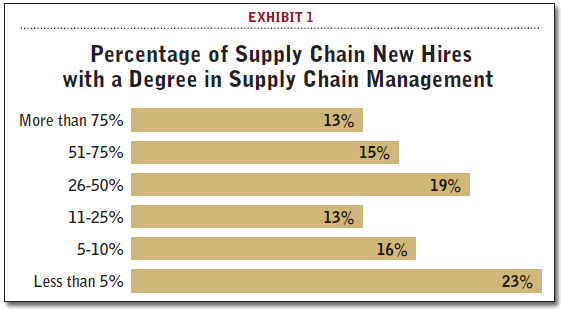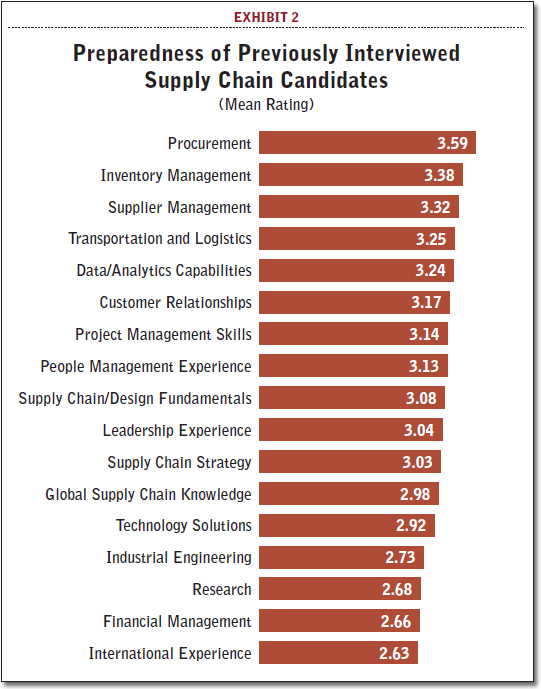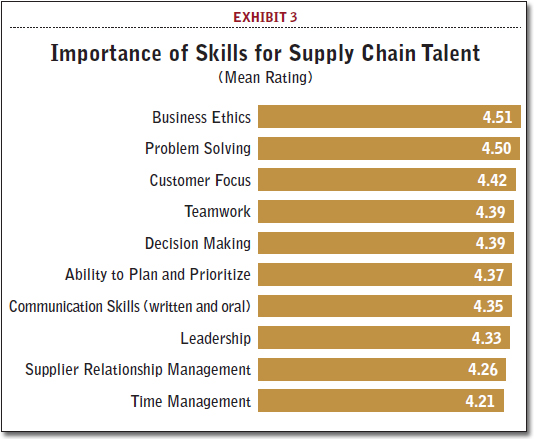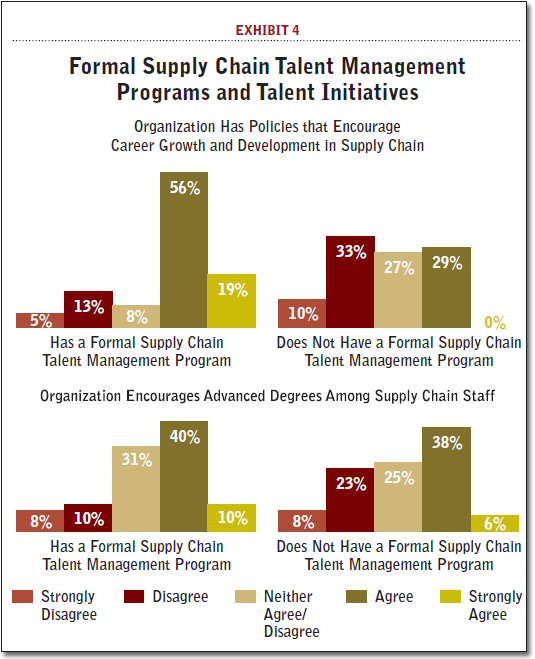Supply Chain Talent Development is Still a Work in Progress
Results from an APQC survey reveal that there are skills gaps among candidates, but organizations are adopting ways to develop current and future employees.
Much attention has been given to the strategic importance of the supply chain management function within organizations.
With the rise of supply chain’s visibility as a discipline, many universities have established supply chain management degree programs at the undergraduate and graduate level to better prepare individuals for positions in the field.
Despite the attention given to the need for talent development and management in the supply chain, there are still unanswered questions about whether graduates with supply chain degrees are adequately prepared for jobs within the profession and whether organizations are actively seeking employees with these degrees.
It is also unclear whether many organizations have established formal supply chain talent development programs to support the employees they do hire.
To gain more insight into talent development in the supply chain, APQC recently conducted a survey of supply chain professionals. Responses were received from 167 individuals representing more than 40 industries. The survey results indicate that the availability of supply chain degrees has not necessarily translated into organizations hiring a large number of professionals with degrees in the field.
In addition, new supply chain hires are often only somewhat prepared for the jobs they will be doing. The results also show that although many organizations recognize the need for talent management programs directed at supply chain staff, many have not created such programs.
Quality of Supply Chain Candidates
APQC asked its survey respondents to indicate the percentage of their organizations’ supply chain new hires that have degrees in supply chain management. Exhibit 1 presents the range of responses APQC received.

The largest group of respondents (23 percent) has less than 5 percent of new hires with degrees in supply chain. The second largest group of respondents (19 percent) indicated that 26 percent to 50 percent of their new hires have supply chain degrees.
Overall, a slight majority of the respondents to APQC’s survey have 25 percent or less of new hires with supply chain management degrees. This would indicate that, although the number of supply chain degree programs is increasing, it has not necessarily translated into an overwhelming number of supply chain professionals in the field with a specialized degree.
Survey respondents were also asked to rate how prepared supply chain job candidates were with regard to several areas of the supply chain discipline. The scale ranged from 1, which denoted that candidates were not at all prepared, to 5, which indicated that candidates were very well prepared. The survey respondents rated supply chain candidates’ skills, on average, lower than 3.6 on every area provided in the survey (Exhibit 2).

These survey results reveal that individuals seeking to obtain a supply chain position have room for further skill development. The areas given the highest ratings by survey respondents still fell within the range denoting that candidates were somewhat prepared.
However, survey respondents indicated that supply chain candidates are better prepared for more basic aspects of the supply chain discipline, such as procurement and inventory management, but are less prepared for more strategic aspects such as international business and financial management.
In another survey question, APQC asked respondents to rate the importance of certain supply chain skills. A rating of 1 indicated that skills were not important at all, and a rating of 5 indicated that a skill was extremely important. Exhibit 3 presents the 10 skills that received the highest ratings from survey respondents and the mean rating for each skill.

The respondents to APQC’s survey place more emphasis on “softer” skills for their supply chain talent. Respondents rated ethics and problem solving most important, followed by more traditional skills such as customer focus and teamwork. Leadership skills were also among the top 10 rated by the survey respondents, which is worth noting given that survey respondents indicated supply chain job candidates were only somewhat well prepared when it came to leadership experience.
Formal Talent Management Programs
Individuals responding to APQC’s survey were evenly split on whether their organizations have formal supply chain talent management programs. To determine how organizations with these programs manage their talent, APQC compared the presence of several aspects of talent management for organizations with formal talent management programs against those without formal supply chain talent management programs. These included:
- making talent management a top priority for the supply chain organization;
- having policies that encourage career growth and development opportunities in supply chain; and
- encouraging advanced degrees among supply chain staff.
APQC asked respondents to indicate the degree to which they agreed that their organizations have adopted these initiatives. Eighty-one percent of respondents from organizations with formal talent management programs agreed or strongly agreed that talent management is a top priority for their supply chain organizations. It makes sense that these organizations would make supply chain talent management a high priority given their investment in a formal talent management program.
However, among respondents from organizations without formal supply chain talent management programs, a slight majority (52 percent) also agreed or strongly agreed that supply chain talent management is a top priority for their organizations. Organizations are recognizing that talent management and development programs focused on supply chain professionals are needed, even though not all have taken the step of establishing a formal program.
Exhibit 4 presents the survey responses with regard to policies that enable career growth and encourage obtaining advanced degrees.

Two-thirds of respondents from organizations with formal talent management programs agreed or strongly agreed that their organizations had adopted policies that encouraged career development among supply chain staff. Only 29 percent of respondents without formal programs indicated that their organizations had adopted these policies and none of the respondents without formal programs strongly agreed.
This indicates that organizations with supply chain talent management programs have most likely incorporated initiatives that encourage development of their supply chain professionals. For organizations without formal programs, the results reinforce that these groups are recognizing the need for efforts to develop and retain supply chain staff but have not yet adopted formal programs that work toward that goal.
Less prevalent seems to be an organizational culture that encourages supply chain staff members to obtain advanced degrees. Fifty percent of respondents from organizations with formal supply chain talent management programs agreed or strongly agreed that their organizations encourage advanced degrees, and 31 percent provided a neutral response. Participants without formal talent management programs had similar responses. Forty-four percent of these respondents agreed or strongly agreed that their organizations encourage advanced degrees, and one-quarter of these respondents provided a neutral response.
Meeting the Demands of the Field
APQC’s survey on supply chain talent management indicates that recent job seekers in the field are viewed as only somewhat well prepared for their job duties by their potential employers. This may be a motivation behind many of the respondents’ organizations considering supply chain talent management to be a top priority.
APQC’s survey also found that many organizations with formal supply chain talent management programs include policies that encourage career growth and development for their employees. This may indicate that organizations are compensating for the skills gaps among new hires by providing development opportunities for these individuals once they have been hired. This is in line with input APQC gathered from practitioners as part of this research. These practitioners indicated that their organizations develop supply chain staff through on-the-job training and rotation programs.
APQC’s survey results also reveal that some organizations are taking a more proactive approach toward developing supply chain talent coming from university programs. Most of the respondents indicated that their organizations provide internship opportunities to college students. Forty-three percent of both groups of organizations are working with universities to develop supply chain management curricula for college students.
Clearly organizations are concerned about the recruitment and development of top-notch supply chain employees who can provide the strategic benefit needed by the enterprise. At present, organizations are still encountering skills gaps among supply chain applicants, despite the wider availability of supply chain degree plans and certificates at universities.
To get employees to the skill levels they need, organizations should consider adopting more formal talent development programs that provide supply chain employees with the real world experience necessary for the field. This can be done in conjunction with more traditional internship programs for college students and collaboration with universities to ensure that supply chain degree programs produce graduates ready to enter the work force.
About APQC: A member-based nonprofit founded in 1977, APQC is the leading resource for performance analytics, best practices, process improvement, and knowledge management. For more information, visit www.apqc.org or call 713-681-4020.
Related: Leveraging the Value of Supply Chain Education
Infographic: Gaps in Supply Chain Talent













